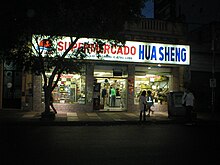Asian Argentines
History

Argentina's Asian population is descended from several waves of Asian immigration that have occurred in the last century. Asian-Argentines live primarily in the capital city of Buenos Aires and often concentrate in their own ethnic neighborhoods. Many own and run their own businesses of varying scales in textiles and grocery retailing.
Japanese immigrants (particularly from the Okinawa Prefecture) arrived in small numbers during the early 20th century. The first Japanese-Argentine Nisei (second generation), Seicho Arakaki, was born in 1911. Today there are an estimated 32,000 people of Japanese descent in Argentina according to Association of Nikkei and Japanese Abroad. A second wave of Asian immigrants (primarily Korean entrepreneurs) settled in Argentina during the 1960s, concentrating in Buenos Aires. Today there are an esimated 35,000 Korean-Argentines living in Argentina, especially in the Once and Flores districts of Buenos Aires. They're mainly involved in the manufacturing and selling of textiles. A third wave of Asian immigration during the 1990s brought many mainland Chinese and Taiwanese entrepanuers to Buenos Aires. A large number of the Chinese entrepreneurs are in grocery retailing. According to Argentine newspaper Clarín, there are more than 60,000 Chinese immigrants or people of Chinese descent living in the country.
While generally accepted by Argentine society, the reputation of the small Asian-Argentine community has been tarnished in recent years by allegations of corrupt business practices. Investigative reports on Korean-Argentine textile factories and stores found that many were employing illegal workers from Bolivia at low wages and violating the nation's labor laws. Korean-Argentines believe that their community has been unfairly targeted and is resented for their economic success.
Argentina is also home to the largest Laotian community in South America, numbering nearly 2,000.
Some Asian-Argentines have left the country for the United States and Canada since the economic crisis of the 2000s.
Discrimination
Argentinians see their nation as having a strongly European (primarily Spanish and Italian) cultural and racial character. Unfamiliarity with people of Asian descent has lent a certain "exoticness" of Asian-Argentines, which may be positive or negative depending on the context. However, the small-sized Asian-Argentine population has generally allowed it to keep a low profile, and usually feel that they are tolerated and accepted in Argentine society.
